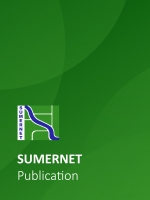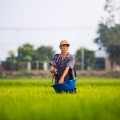Out-scaling water saving innovations to reduce water insecurity conditions of poor and marginalised communities in Vietnam’s Upper Mekong Delta
Abstract
This project proposes to introduce and trial an innovative agricultural water saving technique in several ethnic Khmer villages located in the upper Mekong Delta of Vietnam, as a way to reduce seasonal water insecurity problems, address climate change concerns and improve livelihoods for these relatively marginalised communities. The project will be implemented over a period of 18 months and will have a primary focus on extending use of the promising alternate wetting and drying technique (AWD), which has been shown elsewhere in Asia to reduce water demand by 15 - 30 %. It has been demonstrated to be an effective method of reducing water consumption, decreasing methane emissions and improving overall profitability of rice cultivation in earlier trials conducted in Vietnam, including in An Giang province a few years ago. It is considered both a “water smart” and “climate smart” technique by the International Rice Research Institute (IRRI), the International Panel on Climate Change (IPPC) and other research agencies. However, many of the trials have been conducted under field crop experimental station conditions, with relatively few trialled on-farm under a variety of agro-ecological conditions. The project intends to correct this lacuna and trial the technique using participatory approaches with 80 households in four communities of Tinh Bien district, which has a high proportion of marginalised Khmer ethnicity villages. The agronomic and economic results will be tested against a control group, building confidence that the recommended technology is effective and suitable for wider extension, through government agency channels, principally under the auspices of the Department of Agriculture and Rural Development (DARD), selected as the boundary partner. Through rigorous testing locally, it is envisaged that the multi-disciplinary and inclusive approach and lessons learned will help inform relevant provincial and national policy related to climate change, agricultural water management and water (in)security for the Mekong Delta provinces, and possibly other provinces in Vietnam. Policy engagement is a key goal of the project.
The project expects that extending the AWD technique will be an effective entry point to understanding wider water security concerns for the target communities, including domestic and agricultural uses, that will ultimately directly benefit the households and communities involved. Inclusive involvement of different sub-groups in the pilot villages and the lessons learned from the project could act as a replicable model to follow for DARD and other state (or NGO) agencies involved in agricultural water resources management in similar communities in the Mekong Delta. Its innovation will not only be the water-saving techniques trialed, but also the participatory approaches taken to considering gender, ethnicity, poverty and social equity within the process of analysing water security issues, opening new space for outscaling and upscaling. It is believed that the joint action project can positively influence practical techniques and attitudes towards water insecurity reduction in the Delta region.
Lead contact
Dr. Pham Huynh Thanh Van
An Giang University (AGU), Vietnam
Email: phtvan@gmail.com
Website: Water Saving Innovation | Mekong River Delta (watersavingmrd.wixsite.com)
Facebook: Đề tài Tiết kiệm nước quy mô rộng vùng thượng nguồn Đồng bằng sông Cửu Long | Facebook




 Read more about SUMERNET
Read more about SUMERNET
